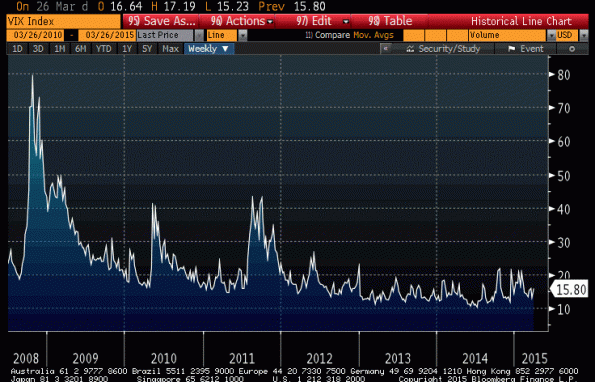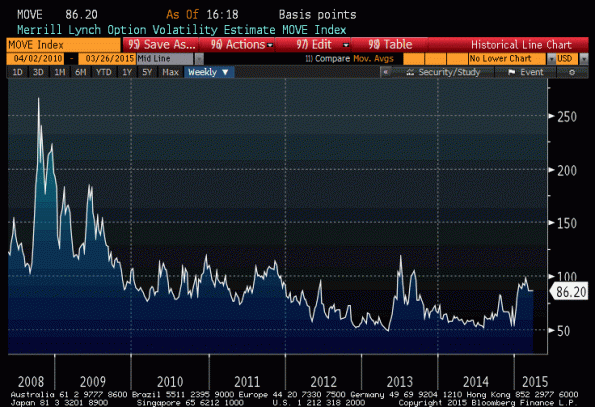As we tick towards the end of the quarter, the news feeds are starting to look like they occasionally do when we are having a big spike in volatility.
We have the Greece deadline coming up. I don’t think anyone knows exactly when Greece’s finances will hit the wall, but it is going to be soon. And, compared with prior incarnations of this exact same crisis, there doesn’t seem to be nearly as much optimism about the probability of a “positive” resolution to this crisis. By “positive,” I mean in the sense that the status quo remains more or less preserved: Greece gets money, and pledges reforms, but nothing actually happens except that Greece’s depression continues. I don’t at all mean positive from the standpoint of the Greeks (I continue to think they will be better off in the medium-term to exit the Eurozone and default on Euro-denominated debt), or even from the standpoint of the Euro (assuming the single currency survives, the departure of Greece will be an important test case for the ramifications of re-shaping the currency bloc to a sturdier subset of countries that intend to move towards fiscal union). Interestingly, and in contrast to prior iterations of the exact same crisis, both sides appear to understand that Grexit does not mean disaster, and to perceive the possibility that it might make sense to let this happen – since, in any event, it is inevitable. There seems to be little urgency to craft a real deal, and the panicky increase in market volatility is missing this time.
The Middle East is increasingly in flames. What I call the “black I’s” of Iran, Iraq, and ISIS are as unstable as ever, but now Yemen is in civil war with the existing government fighting Iranian-backed rebels and today Saudi Arabia plunged into the fight as a counterweight to Iran’s influence. The comments that this should be only a short-term influence on crude oil prices because “the market remains oversupplied” make two assumptions that are possibly questionable here.
One is the technical point that the oil market is oversupplied (true), but that this means current prices should not react to disruptions to future supply. Of course, that is wrong: if it was suddenly discovered that all oil in the world was scheduled to evaporate on January 1st, 2020, you can bet your bottom petrodollar that prices today would (and should) react, even though that date is far in the future. Efficient markets reflect not only spot supply and demand, but also discount expectations for future changes in supply and demand (at least, for commodities that are storable at a reasonable cost).
The second assumption that may be questionable is whether the battle over Yemen is just a skirmish over a country with a small oil production footprint. Indeed, that may be the case. However, the appearance of Saudi Arabia into the fray does make one wonder whether the Saudi Kingdom does see a bigger conflict at play here. To the extent that Yemen is an opportunity for Sunnis (most of the Arab world) and Shia (Iran, most of Iraq) to engage indirectly, it signals rising structural tensions in the region and the possibility for much wider conflict. An analogy might be the Cold War phenomenon of the US and the USSR engaging in conflict by proxy; that conflict never emerged into a hot war but that didn’t make those of us hiding under our desks any more confident in the stability of the situation.
I don’t have a strong opinion on whether either assumption is warranted, but it strikes me that markets for implied volatility ought to be somewhat more bid on either possibility, not to mention what is happening in Greece. And yet, they’re not. The two charts below (source: Bloomberg) show the VIX and the MOVE (for bonds). Neither seems to be displaying much alarm at this point. It feels like we should be having a spike in volatility, but we are not. To me, this makes the buying of protective puts an attractive alternative to consider.


